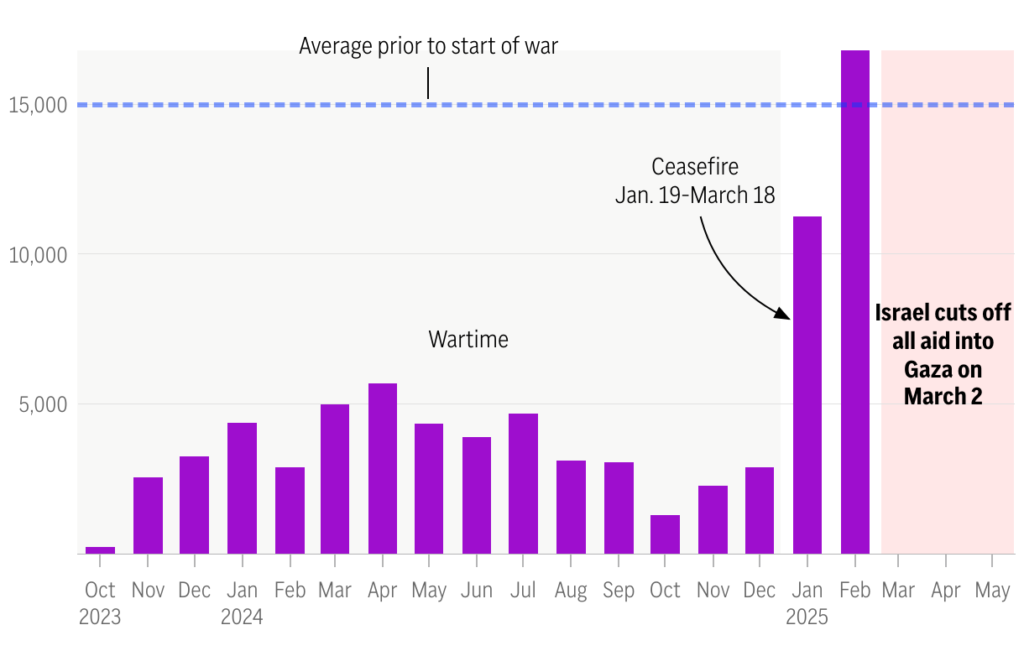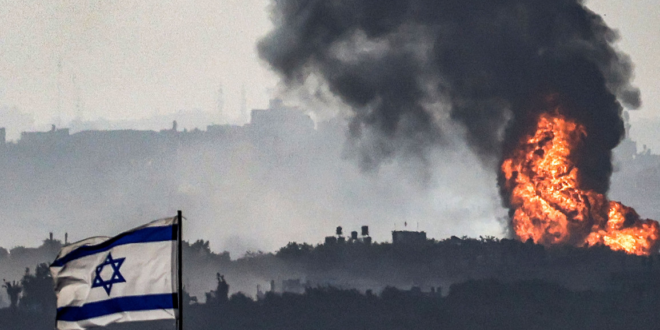Setting the wildfires aside, Israel and its society must confront the crimes, both ecological and engineered, it is committing in Gaza, writes Alex Foley.
On the evening of April 29, a spasm of panic broke out at a Memorial Day ceremony in Tel Aviv’s Habima Square. Ushers at the event were arrested after someone pointed out the “suspicious individuals wearing vests” to police. The arrests cause attendees to flee. Video footage shows crowds running from the square in a near-crush that left twenty injured. Rumours began circulating of gunfire, which the police later had to quell.
The next morning, Israel was burning. According to Israeli fire services, a fire broke out near the Mesilat Zion settlement near Jerusalem, and was quickly blown by strong winds first West, then eastward, causing fears they would reach Jerusalem itself.
By the end of the week, with help from Italy, Croatia, and North Macedonia, firefighters had largely managed to control the blaze, but not before it had consumed over 6,000 acres of land.
On the face of it, these were two independent events connected only temporally. But as I watched footage of the fires my mind went to Joan Didion’s 1968 essay The Santa Anas, a meditation on the katabanic wind event that occurs when high-pressure air masses from over the Great Basin and the Mojave Desert drive down the mountains into low-pressure areas over the Pacific.
These hot winds, Didion understood, bring not only a risk of wildfires, but a mood, a general agitation that makes classrooms unmanageable and drives people to murder or suicide. “The wind,” she writes, “shows us how close to the edge we are.”
In Didion’s essay, she name-checks a number of other similar foehn winds, including the khamsin winds of Egypt and the Levant. Perhaps, then, a similar agitation had blown over the crowds at Habima Square the night before the fires broke out.
Israel has certainly been close to the edge for a while. It is easy to forget, with the intervening genocide, how precarious the situation in Israel was before the Al-Aqsa Flood. People were openly discussing the “curse of the eighth decade,” the tendency of Jewish states to begin collapsing around 80 years into their existence. Months before October 7, I had the displeasure of being stuck in a room with a prominent Zionist figure as she expressed her feelings that the only thing that could keep Israeli society together was “an all-out war on the Arab nations.”
Israel is, at the best of times, a paranoid nation. The settler-colony is known for its siege mentality, a product of, depending who you ask, either its being surrounded by hostile neighbours or the latent knowledge of the mass graves under its beaches. It did not take long for a paranoid discourse to take hold in relation to the fire.
Yair Netanyahu, son of the Prime Minister, announced on X (Twitter) that, “Something here is suspicious,” and intimated that the Israeli left could be behind the fires in a plot to stop “Independence Day” celebrations.
Elsewhere, predictable claims that the Arabs were responsible came thick and fast while authorities stressed they were still investigating the cause, though they made arrests of suspects. Some inverted, with glee, the usual line around indigeneity and who respects the land, conveniently ignoring the total destruction of the South and West in Gaza.

In reality, the speed and ferocity of the fires were due, in large part, to settlement. Didion, the neurotic, was obsessed with infrastructure and wrote about LA freeways, aqueducts, shopping centres, urban sprawl, and the Hoover Dam as a means of keeping the chaos at bay.
She would likely have taken interest in Ghada Sasa’s explanations of how Israel’s efforts to “make the desert bloom” have contributed to the likelihood of wildfires. The large-scale planting of non-native trees like Australian eucalyptus and increased desertification of the Negev due to plantations has made the landscape a tinderbox.
Back in Didion’s native California, another set of embers have been catching, seeds of a coming inferno. Shaiel Ben-Ephraim, an Israeli academic and host of Israel Explained, took to Substack to announce he had, reluctantly, come to the conclusion that Israel is committing a genocide. In the lengthy piece, he outlines how he came to the conclusion that Israel’s assault on Gaza was not being carried out for the stated aims, but rather to eradicate the Palestinians in part or in whole.
Crucially, much of the evidence he presents, especially the statements from Israeli politicians, date from the early days of the genocide. The argument he constructs for dolus specialis, or specific genocidal intent, is based on a pattern of Israeli actions spanning the decades since its inception. The question that presents itself, then, is what changed for him now?
After all, he spent the first year and a half of the genocide engaging in the classic “liberal Zionist” two-step, vacillating between expressing horror over the violence necessary for Israel’s existence and outright atrocity denial.
Back in January of last year, under a video of women and children being forced to flee, Ben-Ephraim commented, “Genocide [sic] are famous for allowing people to leave for their own safety.”
After Aaron Bushnell’s self-immolation, he said, “The American left is solely responsible for his death,” for having pushed the “lie” of genocide. “Your cheap propaganda killed a gullible and mentally disturbed individual.”
Most egregious, in response to a now deleted photo of Sidra Hassouna’s body, the 7-year-old girl who was found hanging from a wall following an Israeli air strike, both her legs shorn from her body, Ben-Ephraim said, “Nice AI bullshit.”
None of this stopped Owen Jones from hosting him on his YouTube channel for what he described as a “robust interview.” The ethics of giving a platform to this man for his image rehabilitation given the above could be the subject of its own piece. Ben-Ephraim seems largely lacking in contrition; when Jones pressed him on his past accusations of “blood libel” towards those calling out the genocide, he claimed he believes that was still an accurate description in many instances.
However, the interview does get to the question of why now. At the beginning of the video, Ben-Ephraim states that one of the things that pushed him over the line was the polarisation forming within his “moderate” sources in the Israeli military between those who began blowing the whistle that the IOF was carrying out mass death atrocities and those who were spouting increasingly genocidal rhetoric.
This tension will presumably only worsen as Israel moves to enact its forced displacement campaign, “Gideon’s Chariots,” likely the final act of the genocide.
Self-professed liberals, like Ben-Ephraim, will have to contend with the crimes committed for their benefit. There is an open-ended question as to how to react to those who have, like Shaiel, come to the realisation this late in the game, but it is certain that more and more will come.
Already, the Israeli army is facing a crisis of huge numbers of reservists refusing to show up for military service. The Shin Bet has announced they are increasing security measures for Netanyahu at public events in response to increasing political tensions.
The winds appear to have blown in pre-October 7 discontent, along with some other anxiety about the edge on which Israel is perched. In the crackle of the blaze was the echo of the final moments for Shaban al-Dalou and the countless others Israel has burned alive.
As the old spiritual says, “God gave Noah the rainbow sign / No more water, the fire next time.”
 Eurasia Press & News
Eurasia Press & News




